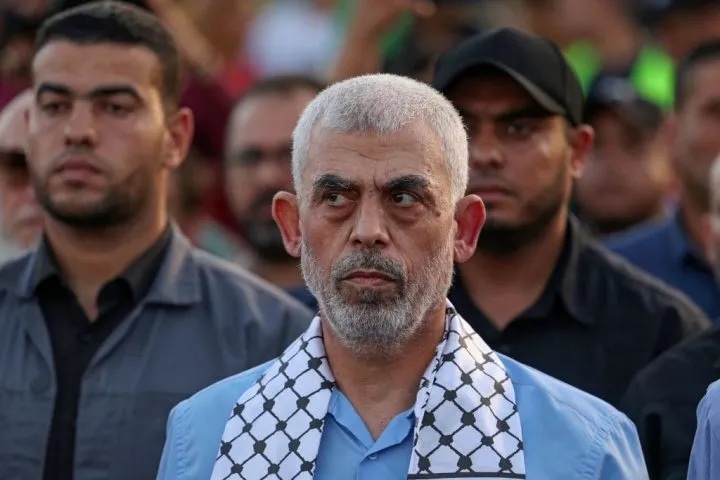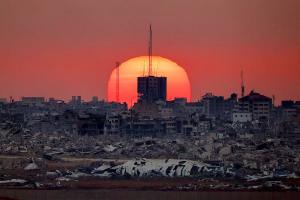Israeli, international and Hamas officials are currently awaiting the decision of Yahya Sinwar, the terror group’s military leader on a proposed ceasefire deal. Egypt has put forward a phased release of Israeli hostages and a temporary end to the fighting in Gaza. Sinwar is looking at the deal. As the talking and the diplomatic maneuvering continues, two IDF combat divisions, the ninety-eight Airborne and the 162nd Armored, are making their final preparations for entry into Rafah. Failure to reach agreement on Egypt’s proposal is likely to set an IDF operation into motion.
Egypt’s proposition would commit Israel to a long and open-ended ceasefire. Over time, Israeli hostages would be swapped for Palestinian prisoners, and the number of Israeli armed forces in Gaza would be reduced. Israeli media has reported that the current stumbling block is whether the ceasefire should be temporary or permanent. The Gazan Hamas leadership wants a permanent conclusion of hostilities, but look a little deeper and it is easy to see why maintaining the current situation might well be preferable to them.
A battle in Rafah would not necessarily represent Sinwar’s last roll of the dice
From their point of view, refusing a deal does not make imminent strategic defeat at the hands of Israel inevitable. Contrary to what Israeli prime minister Benjamin Netanyahu might wish, Sinwar, his brother Mohammed, and the Hamas military leader Mohammed Deif are almost certainly not currently besieged in a bunker in Rafah, surrounded and obliged to either agree to the Egyptian proposal or be crushed beneath the treads of the ninety-eight and the 162nd. In fact, it is not even certain if the Hamas leaders and their hostages are even still in the Rafah area, or if through the intricate Gaza tunnel system, they are now already in some other part of the strip.
An IDF incursion into Rafah is meaningful, in that this remains the only major area still containing a major conventional deployment of forces available to Hamas. But a battle in the town would not necessarily represent Sinwar’s last roll of the dice. While a failure to go into Rafah more or less guarantees an Israeli strategic defeat in the war, entry into the town does not make Israeli victory a sure thing. Victory requires the taking of Rafah, but also additional successes.
The situation in Gaza is subjecting Israel to an ongoing erosion in its international standing. It has returned the Palestinian issue to front and center; it is causing enormous suffering to the people of Gaza (but the Islamist leadership demonstrably doesn’t care about that). The prospect of indictments of Israeli leaders at the International Criminal Court is a realistic one and will become more likely the longer the fighting continues. Sinwar and his cronies are also no doubt observing the steady erosion of national unity within Israel, due to Hamas’s heartless but effective exploitation of the concerns of Israeli hostages’ families over the fate of their loved ones.
Hamas will also be aware of the waves of pro-Hamas protests in European and American campuses and capitals, bringing together supporters of political Islam and those of the radical left. Hamas’s Gazan leadership is doubtless also aware of the strains being placed on relations between the US and Israel, as a result of sharp differences over next military steps. It is in Hamas’s interest to allow all these processes to continue and deepen.
Lastly, no coherent Israeli plan to break the central nervous system of Hamas rule in Gaza appears to have been formulated. Such a plan could take the form of renewed Israeli occupation and military rule of the strip, deploying a couple of divisions for this purpose, until a future arrangement for Gaza’s administration could be formulated. Or, conversely, it could involve the swift implementation of a new political and security system, probably involving some combination of Israeli security presence, local Palestinian self-rule, and participation of Arab forces — probably those of Egypt, Jordan and perhaps the UAE. At present, neither option has been chosen.
Maintaining the current situation involves probable limited cost for the Hamas leadership in Gaza (in terms of things it cares about), and will allow it to continue to maintain the gains that it has made since it carried out the massacres of October 7. As a result, a full affirmation of the Egyptian proposal on the part of Sinwar and those around him appears unlikely. Rather, they will continue to play for time, confident, not without justification, that it is at present on their side.
This article was originally published on The Spectator’s UK website.


























Leave a Reply